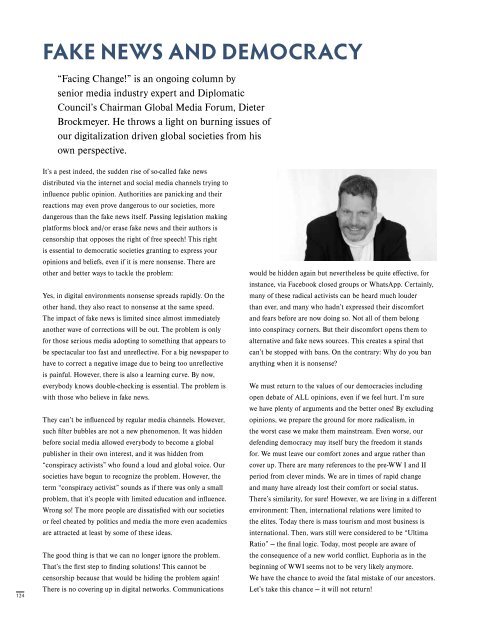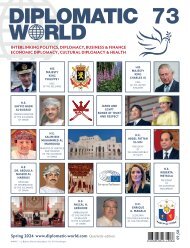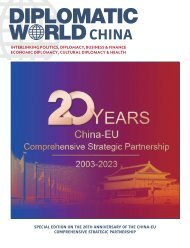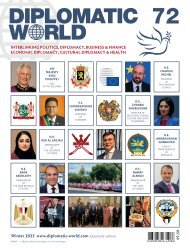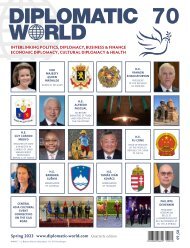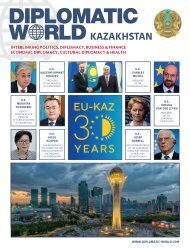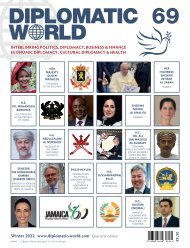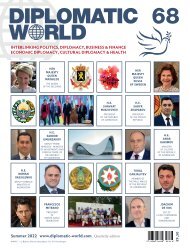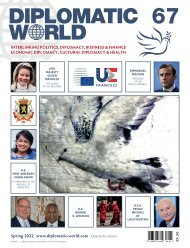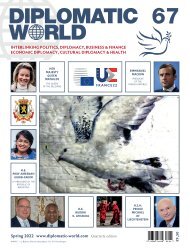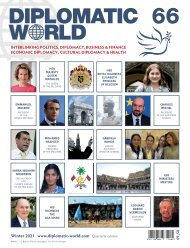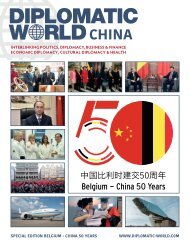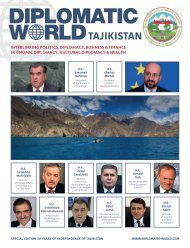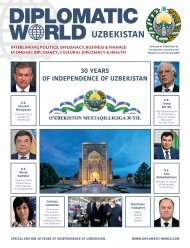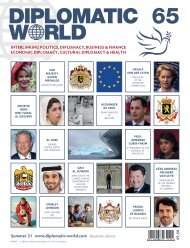Create successful ePaper yourself
Turn your PDF publications into a flip-book with our unique Google optimized e-Paper software.
FAKE NEWS AND DEMOCRACY<br />
“Facing Change!” is an ongoing column by<br />
senior media industry expert and <strong>Diplomatic</strong><br />
Council’s Chairman Global Media Forum, Dieter<br />
Brockmeyer. He throws a light on burning issues of<br />
our digitalization driven global societies from his<br />
own perspective.<br />
124<br />
It’s a pest indeed, the sudden rise of so-called fake news<br />
distributed via the internet and social media channels trying to<br />
influence public opinion. Authorities are panicking and their<br />
reactions may even prove dangerous to our societies, more<br />
dangerous than the fake news itself. Passing legislation making<br />
platforms block and/or erase fake news and their authors is<br />
censorship that opposes the right of free speech! This right<br />
is essential to democratic societies granting to express your<br />
opinions and beliefs, even if it is mere nonsense. There are<br />
other and better ways to tackle the problem:<br />
Yes, in digital environments nonsense spreads rapidly. On the<br />
other hand, they also react to nonsense at the same speed.<br />
The impact of fake news is limited since almost immediately<br />
another wave of corrections will be out. The problem is only<br />
for those serious media adopting to something that appears to<br />
be spectacular too fast and unreflective. For a big newspaper to<br />
have to correct a negative image due to being too unreflective<br />
is painful. However, there is also a learning curve. By now,<br />
everybody knows double-checking is essential. The problem is<br />
with those who believe in fake news.<br />
They can’t be influenced by regular media channels. However,<br />
such filter bubbles are not a new phenomenon. It was hidden<br />
before social media allowed everybody to become a global<br />
publisher in their own interest, and it was hidden from<br />
“conspiracy activists” who found a loud and global voice. Our<br />
societies have begun to recognize the problem. However, the<br />
term “conspiracy activist” sounds as if there was only a small<br />
problem, that it’s people with limited education and influence.<br />
Wrong so! The more people are dissatisfied with our societies<br />
or feel cheated by politics and media the more even academics<br />
are attracted at least by some of these ideas.<br />
The good thing is that we can no longer ignore the problem.<br />
That’s the first step to finding solutions! This cannot be<br />
censorship because that would be hiding the problem again!<br />
There is no covering up in digital networks. Communications<br />
would be hidden again but nevertheless be quite effective, for<br />
instance, via Facebook closed groups or WhatsApp. Certainly,<br />
many of these radical activists can be heard much louder<br />
than ever, and many who hadn’t expressed their discomfort<br />
and fears before are now doing so. Not all of them belong<br />
into conspiracy corners. But their discomfort opens them to<br />
alternative and fake news sources. This creates a spiral that<br />
can’t be stopped with bans. On the contrary: Why do you ban<br />
anything when it is nonsense?<br />
We must return to the values of our democracies including<br />
open debate of ALL opinions, even if we feel hurt. I’m sure<br />
we have plenty of arguments and the better ones! By excluding<br />
opinions, we prepare the ground for more radicalism, in<br />
the worst case we make them mainstream. Even worse, our<br />
defending democracy may itself bury the freedom it stands<br />
for. We must leave our comfort zones and argue rather than<br />
cover up. There are many references to the pre-WW I and II<br />
period from clever minds. We are in times of rapid change<br />
and many have already lost their comfort or social status.<br />
There’s similarity, for sure! However, we are living in a different<br />
environment: Then, international relations were limited to<br />
the elites. Today there is mass tourism and most business is<br />
international. Then, wars still were considered to be “Ultima<br />
Ratio” — the final logic. Today, most people are aware of<br />
the consequence of a new world conflict. Euphoria as in the<br />
beginning of WWI seems not to be very likely anymore.<br />
We have the chance to avoid the fatal mistake of our ancestors.<br />
Let’s take this chance — it will not return!


